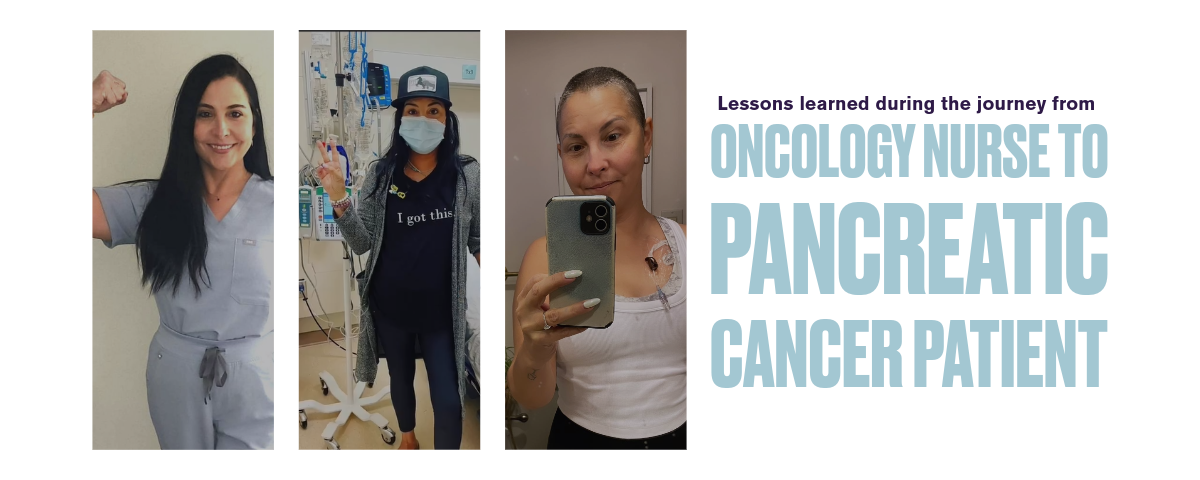
Lessons learned during the journey from oncology nurse to pancreatic cancer patient
Friday, November 17, 2023
When faced with a life-limiting disease like pancreatic cancer, patients are faced with a unique set of challenges. Even for Jenny Guittard, an oncology nurse with 25 years of experience, her Stage 4 metastatic pancreatic cancer diagnosis came with many unexpected obstacles.
“As an RN, I thought I would be well prepared in the event I personally had to face a cancer diagnosis. Little did I know, there would be many surprises, unexpected feelings, and anxieties.” Jenny explained. Since her diagnosis, she has taken to social media to share her experience with a growing online community. While Jenny now has a faithful team of supporters, she noted a common trend amongst the patients in her audience – many also feel uninformed about their treatment plan.
“I appreciate patients are overwhelmed or not feeling well at time of diagnosis; however, it is our job as health providers to ensure they are adequately prepared for treatment,” said Jenny. She now uses her online platform to educate others about the intricacies of cancer care and empowers fellow patients to be self-advocates.
Understanding your treatment plan
In the process of developing a treatment plan, patients may not understand that they need to be medically stable before starting chemotherapy. Certain ailments such as pancreatitis, infections, or biliary obstructions, must be addressed before starting systemic therapy. Many patients tend to follow the direction of their oncologist without truly understanding the context and consequences.
Even Jenny admits she was shocked to learn her T5 metastasis meant she would not be able to start chemotherapy for six weeks. “I was equally impatient. I did not truly understand why I had to wait six weeks to start chemo. I would have appreciated more explanation from my team on timing and the rational of my treatment plan.”
Managing unexpected side effects
Eventually, when Jenny did begin chemo, she experienced several unexpected side effects. “I had severe numbness to my face, tongue and muscle cramping during my infusion. The intensity was scary and caught me by surprise,” said Jenny. She encourages patients to talk to their doctors and work together to choose treatments that fit the goals of their care. “You must outweigh the risk versus the benefit of chemotherapy.”
Many patients do not understand the role that their pancreas plays in digestion, which means they may be unprepared for significant weight loss and the signs and symptoms of pancreatic insufficiency. Patients may be unsure what foods they should eat and what foods they should avoid. A dietitian may be a valuable resource to work with patients on developing a plan based on their nutritional needs, which could include enzymes to mitigate digestion issues such as indigestion, malabsorption, and bloating.
Navigating practical and emotional impacts
A cancer diagnosis can bring overwhelming emotions, stress, and uncertainty. For Jenny, the loss of independence was incredibly difficult. “Being forced to stop work was significantly difficult for me, and confusing considering I work where I’m being treated,” she explained. Jenny also felt debilitating stress around the timing of CT scans, a sensation commonly referred to as ‘scanxiety’.
“I did not truly appreciate the amount of anxiety I would experience leading up to these scans. I felt like I was ‘living’ in increments from scan to scan.” Jenny believes that an open dialogue with health providers about mental health is critical and can help patients to develop coping strategies. Sharing the variety of programs and support services available to patients and their families up front is important in ensuring access to the supports they need throughout the cancer journey.
Four months after her diagnosis, Jenny sought out assistance from our partners at Wellspring. Jenny knew she could attend certain activities at her local Wellspring Centre because she was a nurse but did not know about additional resources available to her.
Pancreatic Cancer Canada in partnership with Wellspring Cancer Support Foundation offer specialized programs for people impacted by pancreatic cancer including Peer Support and Short-Term Counselling. These programs are specifically geared towards patients and loved ones experiencing the unique impact of pancreatic cancer. Through this program, Jenny was referred to the pancreatic cancer support group and connected with a psychotherapist. These support services are available across Canada and are completely free of charge.
Learn more about specialized support programs for patients and their families.
Pancreatic Cancer Canada is committed to ensuring patients and their families feelsupported and have access to the specialized care and support they need at every stage of their diagnosis.

Recent Comments